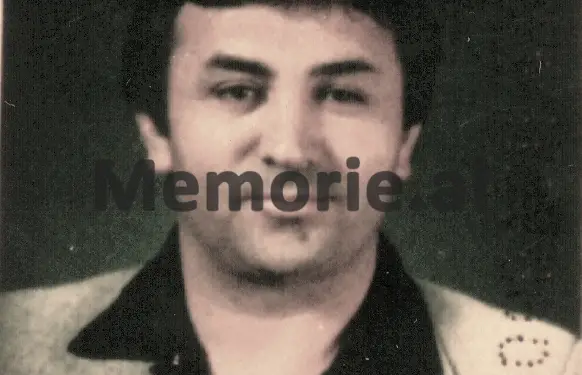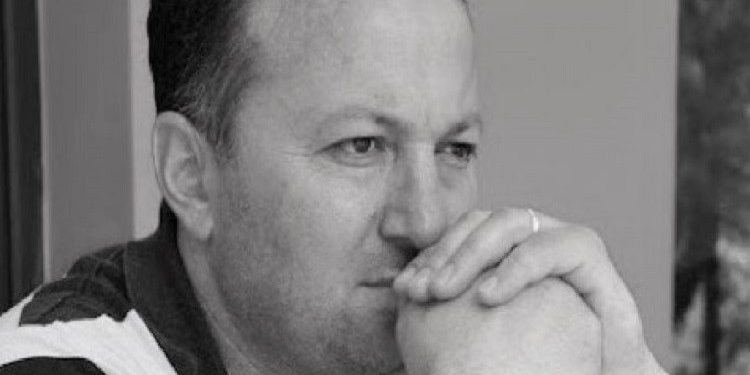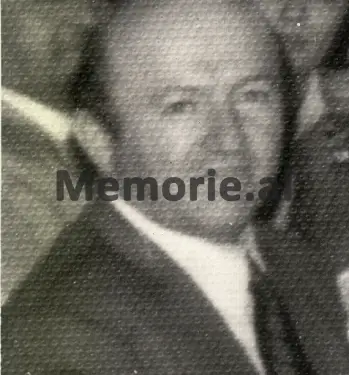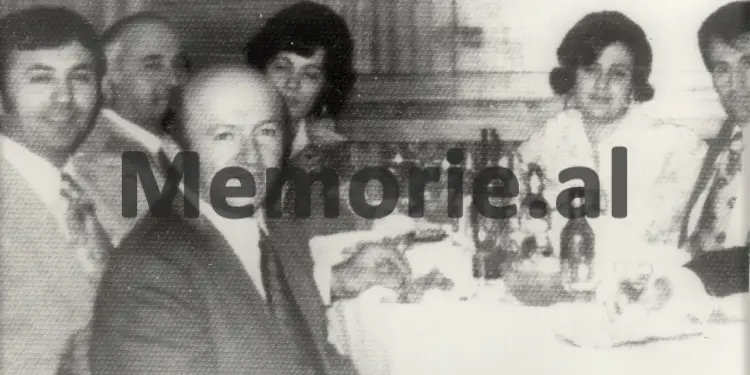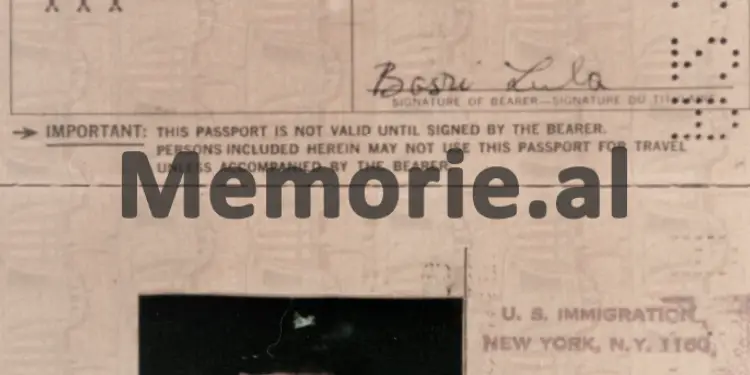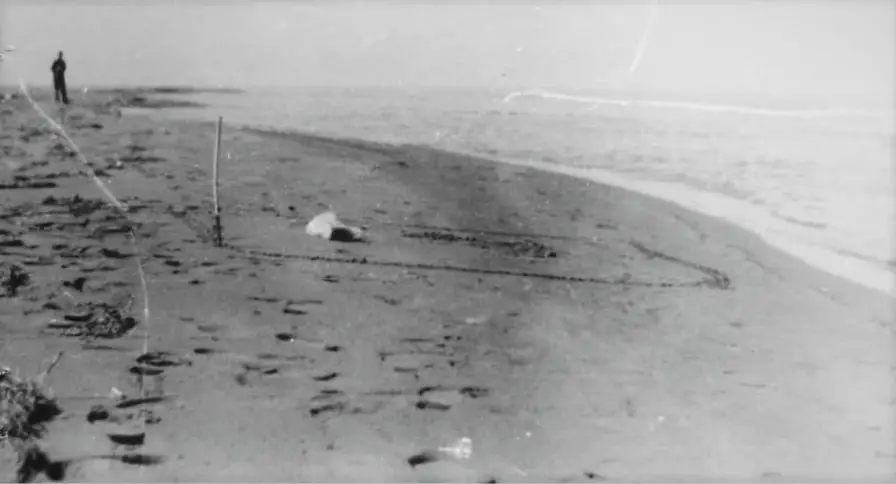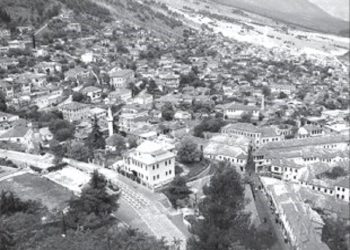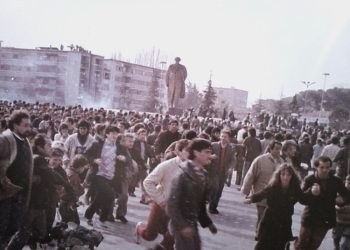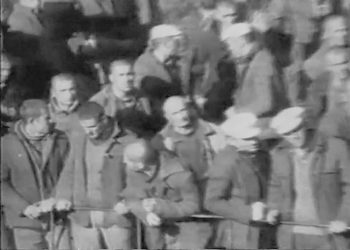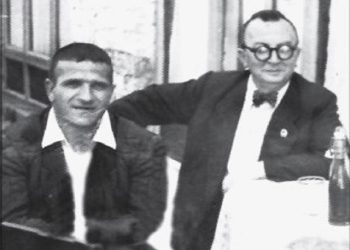By Ferdinand Dervish
The second part
Memorie.al / Until the day when Xhevdet Mustafa’s group landed in Divjaka, the beach policeman, Sokrat Biti, had lived a quiet life. Even pleasant, compared to that of other peers, to whom the frog fell in the fields of the agricultural cooperative. His father, an old fisherman, had managed, because of his profession, to have strong friends, even the head of the list was himself, Kadri Hazbiu, a trusted man of power and a powerful minister at that time. For these reasons, it was easy for him to join the ranks of the police, even though he did not have the relevant higher education. So, for 25-year-old Sokrat Biti, even the black day of September 25, 1982, had started with a good outlook, like all the others. Tour the sea with a boat to monitor the beachgoers, exactly in the role of a baywatch and further at the disposal of the deputy chief of the Lushnja Police, Remzi Brixhi, who was badly bitten by the fishing worm.
Continues from last issue
Sokrat Biti, the former policeman of Divjaka beach, following his confession, recalls: “Something was said between them and I saw the other two, Sabaudini and Halit Bajram, leaving with a redeemed look towards the entrance of the train station, taking only the pistols themselves, which they hid under their clothes. While Xhevdeti did not move from the place. Of course, I stayed by his side, because we still had our hands tied with wire.
He had a worried look and I remember how he accompanied with his eyes all the people who entered the station, especially those who looked like him or who were really policemen. A few minutes passed, when we saw Sabaudin come out of the main door of the station and head to where we were sitting. At this time, shots were also heard”, Sokrati confesses with his eyes fixed on one point.
Also, Biti explains that, according to different accounts, at the station, Sabaudini and Haliti had caught the eye of a pie seller, after they had left her a 50 ALL tip. The seller immediately alerted the station police, explaining how two suspicious people, who spoke a heavy Albanian, had left a large tip, that they were wearing foreign-made clothes, etc. The policeman had approached both of them, asking for their passports; meanwhile Haznedari had left, explaining that he had to go outside the bar, to get his ID cards, to his bag.
But as soon as Sabaudini turns his arms, the other, Halit Bajrami, surrenders to the same policeman, giving him the pistol as well. At the same time, he explains to the man in uniform that there is a third person outside, that this third person is very dangerous and that they are murderers. It seems that at this time, the police signaled some riflemen of the volunteer forces, who were ready, who, as if emerging from the underground, immediately opened fire, in the direction of Haznedar, who was leaving.
“When he saw Sabaudin coming out of the main door of the station and coming running in our direction, accompanied by the krismats, Xhevdet did not wait for him, but took me with him, almost dragging me, and we crossed the tracks, to enter at the station from behind him. There he untied me. For a moment, I thought I was dead.
Meanwhile, the crises increased. Sabaudini appears, reached the bunkers and retaliated with machine gun fire. There he was hit by a bullet in the head, without giving him the opportunity to take any other innocent with him. I remember that after that, those riflemen boasted a lot and claimed credit for the murder. They even boasted that they were very good snipers.
At the same time, a train had arrived at the station, which I think was going from Tirana to Pogradec. Xhevdet entered among the many passengers who were getting off and for a moment I realized that I had a golden opportunity to leave”, says Sokrat Biti with a surprising clarity of memories. And indeed, from this moment on, he would no longer see Xhevdet Mustafa alive.
He uses the opportunity when he, confused, enters the door first, to leave the station and turns his back, to leave quickly in the opposite direction. The presence of many passengers helps him to have a collected mind for this brave action, since he had imagined that the bullets of Xhevdet Mustafa’s pistol would be stuck in his back.
“We came to take revenge, for Mehmet”!
Subsequently, after Xhevdet Mustafa had left in the direction of Lushnja, forcibly taking a car, Sokrat Biti was able to breathe freely after almost 20 hours. He explains how very quickly, he had communicated with his police colleagues, telling them how they had taken him hostage, how a certain Rexhep Kolli, probably from the State Security, had taken him in a car and together they had gone there from Xhevdet, in attempt to leave, where he shed again, the blood of the innocent.
He remembers how he confessed to Koll and the others, that he, the youngest and most powerful, who had held him hostage, had killed, before his eyes, the deputy chief of the Lushnja Police, Remzi Brixhi, as well as the forest policeman, Vlash Proboti.
Once, information had arrived in their car that Xhevdeti had left in the direction of Elbasan. They had headed there, but soon returned. Xhevdet was stuck in a house, in Zhama, Lushnja, arrived there after changing several cars, taken by force, under the threat of a pistol barrel.
The hours of Mustafa’s siege had passed without any particular emotion for Sokrat Biti. It was the time when he had felt a great emotional release. In the end, he had managed to survive. But the fate of the man who held him hostage was already determined. Once the cremes fell and Socrates, without any particular interest, saw the corpse of the man who had held him hostage. It was bloody, lifeless, and unable to do any further harm.
That day was closed, with the care of the other corpses. Socrates had left again for Karavasta, where the corpses had already been found. There he learns that Xhevdet had also killed his two other colleagues, Úngell and Sazan, a truth that had been brought to his mind several times by the fact that when he first saw Xhevdet Mustafa and the other two, they they were coming exactly from the direction where his two colleagues had left about 30 minutes before.
When in the midst of all that time that had passed, Socrates remembers to go and relax at home, he realizes that evil had opened the doors, several times. Because those of the State Security and further the investigation, call him to interrogate him. He obeys, tells the whole truth, but remains open-mouthed and almost faints when they tell him that he had misused his duty, that he should have thrown himself down Xhevdet Mustafa’s throat, and other similar things.
– “Why weren’t you at the beach that day, at your usual place of work, but fishing”?! – “Because we went fishing on the order of the deputy chief, Remzi Brixit”. – “But why were you without uniform that day”?! -“Because I always take it off when I work with the boat. Otherwise, I would get wet when I put the boat out to sea”.
– “Why didn’t you also go with the Angel of Sazan, to observe the coast”? – “Because I didn’t want to run away from the coast. We stopped there and threw a hook…”!
Socrates has lost his mind a lot, why they asked him these meaningless questions! However, he didn’t learn it right away. It seems that it was suspected that he, as a resident who knew the area well, had connections with Xhevdet Mustafa’s group. It was also suspected, also due to the fact, why only he was left alive. But it seems the truth had even deeper roots than that.
Since in this case, to escape from the clutches of the State Security, even the powerful friends of the family, headed by Kadri Hazbiu, did not help him. He himself, Kadriu, immediately after this event, was involved in trouble that ate his head. More than once, the thought that the history of his family relationship with Kadri Hazbiu and further, the hypothetical relationship of the two, with the group, would be considered in the framework of the investigation was painfully dismissed in Sokrat Biti’s mind of Xhevdet Mustafa.
At least the questions that the State Security had asked him had forced him to make such logical connections. Connections that, in any case, had taken a long time to become clear in his head. It was a time when everything had to be measured well, once you became part of a conspiracy that reached the dome of the state, it was not at all impossible, and to be a man without a position, a simple beach policeman, it was equal to guaranteed defeat.
The three people who took him hostage had come to kill Enver Hoxha, and that was no small feat. Thinking in this direction, Sokrati remembered that at least on one occasion, Sabaudin Haznedari had attacked him, threatening him and telling him textually: “We have come to take revenge for Mehmet Shehu, who you killed, even though you kept alive with bread”. A phrase that, at the moment it was said seemed meaningless to the former beach policeman, but which he later reassessed.
Eight years in prison
The problems, immediately after the arrest, were also discharged in the family. “They put him in the ground, alive in the village, before I went to trial. They also removed him from his job. They remembered that I was an accomplice”, confesses Sokrati, about the difficulties of his family, after the event. They were saved from the endless horror only after he was accused and convicted, only for abuse of office. Although the judge had awarded 8 years of imprisonment, ultimately this proved to the public that Sokrat Biti was not an enemy.
Soon after, his father regained his job, in fishing, a development that gave him the opportunity to go to Tirana, with any chosen fish in his bag, to contact old or new friends and ask for a mitigation of the sentence of his son. However, the final punishment, for Socrates’ abuse of office, remains 8 years of imprisonment. And he was not the only one punished. Together with him, under the same absurd charge of abuse of office, Halit Bajrami, the State Security infiltrator in this group, Kapllan Shehu, the head of the Internal Affairs Branch in Lushnje, as well as the head of Police, Fane Xhuveli, who unfortunately were not on duty on the day of the event?
As a result, in the absence of the deputy chief, Remzi Brixhi, who was killed by Xhevdet Mustafa, all the work and organization had fallen on the shoulders of the Lushnje police officer, Isuf Hoxha. “I remember that Lenka Cuko, the former member of the Political Bureau from Lushnja, crushed these two police leaders, Kapllanin and Fanen, completely with accusations. Kapllani, unfortunately, was Kadri Hazbi’s brother-in-law. It was a strong pressure, which was reflected a lot by the people”, Sokrati confesses.
However, fate brings, that after 3 years, 3 months and 13 days, the former policeman of the beach of Divjaka, who was taken hostage by Xhevdet Mustafa, wins his freedom. With a big story on his shoulders, because of which he paid dearly, Socrates starts work in the fishing enterprise, more precisely; his father leaves his place, after he retires.
As luck would have it, immediately after changing the systems, he was smart enough to build a bar in Divjak, in the center, which seems to enjoy a good clientele. At the same time, he goes to work for 4 years as an immigrant in Italy, exactly where the three armed men who held him hostage for 20 hours left for isolated Albania, causing a massacre with 6 killed , three of them policemen, and one army officer. But Socrates in Italy, he went to work, of course.
“Today you may not be able to conceive it. But then, it was a scary event. Now, judging coldly, my opinion of those three is that they were completely disoriented and unprepared for what they had undertaken to do. They had Montenegrin passports with them and it is understood that in the first case, they would become suspicious. On the other hand, it didn’t occur to them to use the uniforms of the policemen they killed. Dressed in such uniforms, they had to go to Tirana for two hours. As for Xhevdeti, I didn’t think he was intelligent at all. Haznedari was different; he was fierce and very intent against the regime. While Halit Bajrami did not speak at all”, adds Sokrati, at the end of the confession.
But it is not over. As the conversation comes to an end, he hastens to add something that seems to have made him suffer inside for a long time. “I have never owed anyone anything. I felt very sorry for those boys who were killed, but I had no chance to help them. They were in the prime of life. Fortunately, no one was killed because of me, because I would have remained a hostage, and this makes me in a certain way, feel calm spiritually”, concludes the confession, accompanied by an up-and-down movement of the hand, ex – the Divjaka beach policeman.
Xhevdet Mustafa, next to Garibaldi and Gorky, in the book of Staten Island
It seems that in the United States of America, the story of Xhevdet Mustafa’s brave but failed incursion into the concretely communist Albania, with the aim of killing Enver Hoxha, has not gone unappreciated. And this despite the fact of his biography. Thus, in a book by the author Thomas Matteo, recently published about the history of Staten Island, which is a neighborhood of New York, the name of Xhevdet Mustafa is found next to that of the famous Russian-Soviet writer, Maxim Gorky, the politician and leader of well-known Italian, Giuseppe Garibaldi, but also next to the name of Don Antonio de Santa Anna, Mexican political leader, who was elected 11 times as president of this country.
That all these special characters, according to the author of the book, have used the Staten Island neighborhood to escape persecution, or in short, to hide. In the history of the same neighborhood, next to that of Mustafa, but for other values, there are also the names of powerful entrepreneurs, such as; Cornelius Vanderbilt, Donald Trump, Charles Goodyear and Daniel Tompkins. Likewise, right next to the name of the Albanian, there are also the names of famous writers, Henry Wadsworth Longfellow, Henry David Thoreau and Ralph Waldo Emerson, who lived in Staten Island at different times. Memorie.al
The next issue follows




